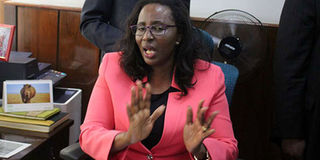Support women to deliver in leadership

Ms Beatrice Elachi speaks about her impeachment on September 10, 2018. Due process must be followed in the evaluation of performances by women leaders. PHOTO | FILE | NATION MEDIA GROUP
What you need to know:
- The National Gender and Equality Act 2011 and the National Gender and Equality Commission (NGEC) have done a lot to enhance women’s rights.
- Women must be protected from undue social and cultural biases and prejudices and be judged on their ability to deliver.
The wheels of change in the women’s empowerment movement turn rather slowly.
In Kenya, 55 years after independence, there are fewer women than men in leadership despite near-parity in population and education. Elective and appointed positions in most sectors are male-dominated.
And this is not from want of women leaders trying. Pioneer women’s leader Phoebe Asiyo chronicles in her recently launched memoirs, It’s Possible, how ambitious women leaders approached President Mzee Jomo Kenyatta with a proposal for a 50-50 gender leadership appointment at independence.
But until the 1980s, no woman had occupied a Cabinet position. Things are much better now and Kenya boasts of six female Cabinet secretaries.
Sadly, history is fraught with cases of women who rose to senior positions but suffered harassment and intimidation in an effort to wrest power from them.
ROSE MWONYA
Recently, Nairobi County Assembly Speaker Beatrice Elachi suffered an impeachment scare, seemingly for her reluctance to authorise foreign trips for her tormentors. Only the courts saved her.
Egerton University Council sent Vice Chancellor Rose Awuor Mwonya on compulsory leave for allegations of “skewed” awards of scholarships and authorisation of projects.
Prof Mwonya’s removal was executed before investigations by Inspector-General of State Corporations, as required. This is a familiar script.
Would these women leaders have been treated the same way had they been men? Why should Kenyan women face such an arduous time in leadership positions, suffer social ignominy and be easy targets for removal?
CULTURE
The reason is our socially and culturally validated attitude towards female leaders: It is male hegemony.
Our cultures have idealised the man as the natural leader and the woman as the natural subservient follower. In some cultures, women are equated to children and treated in the same manner as those they bore.
Sadly, this notion has been so culturally dominant that some women leaders are blind to the paradox of their participation in it.
That is a card that many male leaders play in patriarchal societies to intimidate and depict women leaders as weak.
In the United States, 2016 Republican presidential candidate and eventual winner Donald Trump repeatedly described his female rival, Hillary Clinton, as a weakling who could not handle the threat of terrorism and other challenges, despite her impeccable record as the Secretary of State.
VIOLENCE
In her memoir on the campaign, What Happened, Ms Clinton describes how the male candidate stalked her on stage to intimidate and pressure her to blow up so as to prove she is incapable of handling political pressure.
Women leaders in Kenya have faced such and worse gendered abuse with physical violence the choice tactic to scare them away.
Male hegemony is pervasive, even with a full-fledged United Nations programme, UN Women, to advance women’s rights.
There is also a host of global and continental conventions to ensure fair and equal treatment of women. Our Constitution provides for women’s protection through the Bill of Rights.
The National Gender and Equality Act 2011 and the National Gender and Equality Commission (NGEC) have done a lot to enhance women’s rights.
Only in the Judiciary do we have near-parity in gender job distribution — at 47 per cent, going by the 2016 NGEC survey.
GENDER RULE
UN Women’s ‘World Survey on the Role of Women in Development (WSRWiD 2014)’, calls for embracing women’s equal participation as leaders and decision makers in society.
The endeavour by conscientious leaders in Kenya to actualise the one-third gender rule in public appointments will go a long way in giving women the opportunity to serve and prove their worth.
The transformative community projects that many woman representatives have established with the limited funds from the National Government Affirmative Action Fund (NGAAF) have demonstrated their abilities.
Just last month, President Uhuru Kenyatta feted 29 women leaders with State honours for their exemplary service to the country.
Women must be protected from undue social and cultural biases and prejudices and be judged on their ability to deliver.
Due process must be followed in the evaluation of their performances. Gender must not be an overriding criterion.
Prof Kobia is the Cabinet Secretary, Public Service, Youth and Gender Affairs. [email protected]





